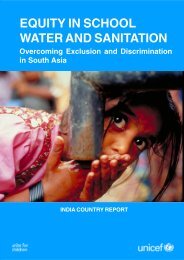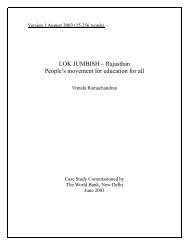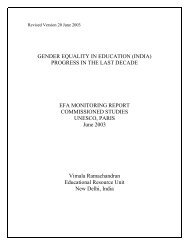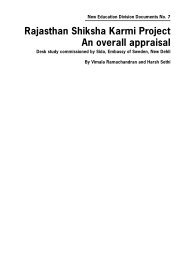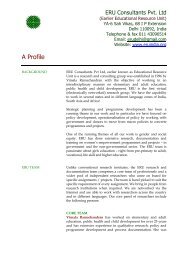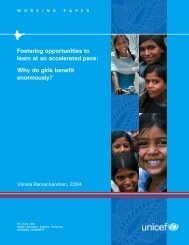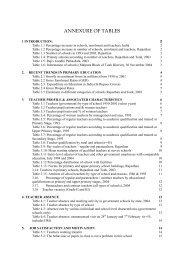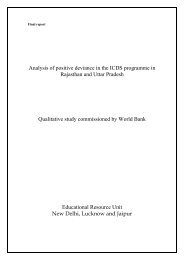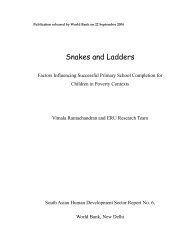primary school teachers the twists and turns of everyday practice
primary school teachers the twists and turns of everyday practice
primary school teachers the twists and turns of everyday practice
Create successful ePaper yourself
Turn your PDF publications into a flip-book with our unique Google optimized e-Paper software.
Version 20 Oct 08, edited final<br />
Health Survey (NFHS) led to growing cynicism about <strong>the</strong> validity <strong>of</strong> this<br />
information. Way back in 1996, Madhya Pradesh (MP) conducted a state-wide<br />
house-to-house survey (known as <strong>the</strong> Lok Sampark Abhiyan) covering 53,460<br />
villages, 6.1 million households <strong>and</strong> 10 million children, which revealed that <strong>the</strong><br />
situation with respect to <strong>primary</strong> education in <strong>the</strong> state was nowhere near as positive<br />
as was commonly believed. The problem <strong>of</strong> non-enrolment was found to be quite<br />
severe, especially in tribal hamlets with highly dispersed populations <strong>and</strong> for<br />
children from socially disadvantaged communities in non-tribal areas. The state<br />
government decided to act on it. More importantly, <strong>the</strong> survey data was alleged to<br />
have ‘called <strong>the</strong> bluff’ <strong>of</strong> system statistics <strong>and</strong> <strong>teachers</strong> were blamed for fudging <strong>the</strong><br />
data.<br />
Very soon o<strong>the</strong>r states followed <strong>the</strong> Madhya Pradesh path. For example, Andhra<br />
Pradesh carried out a similar survey to ascertain <strong>the</strong> number <strong>of</strong> out <strong>of</strong> <strong>school</strong><br />
children <strong>and</strong> child workers. Gradually, by 2000, <strong>the</strong> household survey as a tool for<br />
educational planning gained <strong>of</strong>ficial recognition <strong>and</strong> when SSA was launched in<br />
2001-02, it was built into <strong>the</strong> programme as a precursor to <strong>the</strong> ‘bottom-up’ planning<br />
process. Ironically, <strong>teachers</strong> were made responsible for conducting <strong>the</strong> household<br />
survey. Remember Malati? She was expected to go from house to house to ga<strong>the</strong>r<br />
data but was later advised by her superior to meet <strong>the</strong> village pradhan <strong>and</strong> fill out<br />
<strong>the</strong> forms, making sure <strong>the</strong> number <strong>of</strong> out <strong>of</strong> <strong>school</strong> children went down.<br />
Till <strong>the</strong> late 1960s <strong>school</strong>s were visited by a School Inspector (SI) who was supposed<br />
to interact with <strong>teachers</strong> <strong>and</strong> students, observe classroom sessions in progress,<br />
maybe teach one lesson, look at <strong>the</strong> notebooks to ascertain how much <strong>of</strong> <strong>the</strong> syllabus<br />
had been covered <strong>and</strong> so on. The older <strong>teachers</strong> we interviewed said that <strong>the</strong> SI’s<br />
visit was an important event impelling <strong>teachers</strong> to make an effort to cover <strong>the</strong><br />
syllabus. But things changed in <strong>the</strong> 1970s, <strong>and</strong> today one has a situation where <strong>the</strong>re<br />
is no inspection: <strong>the</strong> cluster <strong>and</strong> block <strong>of</strong>ficials visit <strong>the</strong> <strong>school</strong>s to collect data <strong>and</strong><br />
look at registers. For example, a study done by IIM Calcutta found that <strong>the</strong> SIs in<br />
West Bengal were overloaded <strong>and</strong> that it was impossible for <strong>the</strong>m to visit all <strong>school</strong>s<br />
even once a year. The report noted that ‘management <strong>and</strong> control at <strong>the</strong> ground level<br />
was almost non-existent <strong>and</strong> nothing was done even after <strong>the</strong> Ashok Mitra<br />
Committee recommended immediate measures to improve management <strong>of</strong> <strong>school</strong>s<br />
<strong>and</strong> supervision’ (Chhattopadhaya <strong>and</strong> Reddy 2001). Teachers in Rajasthan said that<br />
<strong>school</strong>s located in rural areas, especially those that are not on <strong>the</strong> main trunk routes,<br />
are rarely visited. With <strong>the</strong> coming <strong>of</strong> <strong>the</strong> mobile phone, block level <strong>of</strong>ficials call to<br />
get information or give out <strong>the</strong> forms during monthly meetings. There are many<br />
<strong>school</strong>s that have not been visited for over a year <strong>and</strong> even when <strong>the</strong> BRC or <strong>the</strong> CRC<br />
personnel visit <strong>the</strong> <strong>school</strong>s, all <strong>the</strong>y do is look at registers, especially those related to<br />
mid-day meals.<br />
This observation corroborates <strong>the</strong> findings <strong>of</strong> an earlier study which found that<br />
<strong>teachers</strong> in sample <strong>school</strong>s spent a lot <strong>of</strong> time filling out forms <strong>and</strong> in single-teacher<br />
<strong>school</strong>s very little time was devoted to teaching. When <strong>the</strong> cluster resource persons<br />
who are meant to provide academic support to <strong>teachers</strong> visited <strong>the</strong> <strong>school</strong>s, <strong>the</strong>y<br />
ended up merely collecting information. Sharma <strong>and</strong> Ramach<strong>and</strong>ran (forthcoming)<br />
point out:<br />
The supervision <strong>of</strong> <strong>school</strong>s indicated <strong>the</strong> same dynamic. On <strong>the</strong> one h<strong>and</strong>, supervisory<br />
<strong>of</strong>ficers told interviewers that <strong>the</strong>y were engaged in so many tasks that <strong>the</strong>y could not<br />
find time to supervise. On <strong>the</strong> o<strong>the</strong>r h<strong>and</strong>, discussions with <strong>teachers</strong> showed that when<br />
19



